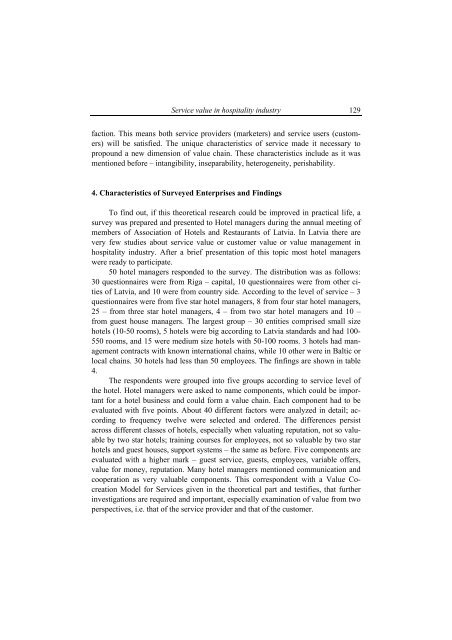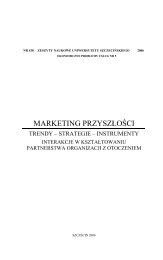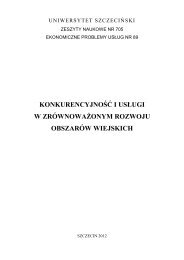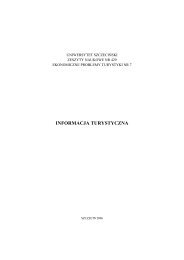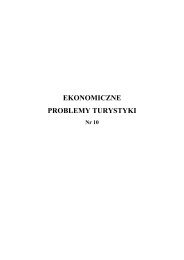Zeszyt naukowy - caÅoÅÄ - WydziaÅ ZarzÄ dzania i Ekonomiki UsÅug
Zeszyt naukowy - caÅoÅÄ - WydziaÅ ZarzÄ dzania i Ekonomiki UsÅug
Zeszyt naukowy - caÅoÅÄ - WydziaÅ ZarzÄ dzania i Ekonomiki UsÅug
You also want an ePaper? Increase the reach of your titles
YUMPU automatically turns print PDFs into web optimized ePapers that Google loves.
Service value in hospitality industry 129<br />
faction. This means both service providers (marketers) and service users (customers)<br />
will be satisfied. The unique characteristics of service made it necessary to<br />
propound a new dimension of value chain. These characteristics include as it was<br />
mentioned before – intangibility, inseparability, heterogeneity, perishability.<br />
4. Characteristics of Surveyed Enterprises and Findings<br />
To find out, if this theoretical research could be improved in practical life, a<br />
survey was prepared and presented to Hotel managers during the annual meeting of<br />
members of Association of Hotels and Restaurants of Latvia. In Latvia there are<br />
very few studies about service value or customer value or value management in<br />
hospitality industry. After a brief presentation of this topic most hotel managers<br />
were ready to participate.<br />
50 hotel managers responded to the survey. The distribution was as follows:<br />
30 questionnaires were from Riga – capital, 10 questionnaires were from other cities<br />
of Latvia, and 10 were from country side. According to the level of service – 3<br />
questionnaires were from five star hotel managers, 8 from four star hotel managers,<br />
25 – from three star hotel managers, 4 – from two star hotel managers and 10 –<br />
from guest house managers. The largest group – 30 entities comprised small size<br />
hotels (10-50 rooms), 5 hotels were big according to Latvia standards and had 100-<br />
550 rooms, and 15 were medium size hotels with 50-100 rooms. 3 hotels had management<br />
contracts with known international chains, while 10 other were in Baltic or<br />
local chains. 30 hotels had less than 50 employees. The finfings are shown in table<br />
4.<br />
The respondents were grouped into five groups according to service level of<br />
the hotel. Hotel managers were asked to name components, which could be important<br />
for a hotel business and could form a value chain. Each component had to be<br />
evaluated with five points. About 40 different factors were analyzed in detail; according<br />
to frequency twelve were selected and ordered. The differences persist<br />
across different classes of hotels, especially when valuating reputation, not so valuable<br />
by two star hotels; training courses for employees, not so valuable by two star<br />
hotels and guest houses, support systems – the same as before. Five components are<br />
evaluated with a higher mark – guest service, guests, employees, variable offers,<br />
value for money, reputation. Many hotel managers mentioned communication and<br />
cooperation as very valuable components. This correspondent with a Value Cocreation<br />
Model for Services given in the theoretical part and testifies, that further<br />
investigations are required and important, especially examination of value from two<br />
perspectives, i.e. that of the service provider and that of the customer.


